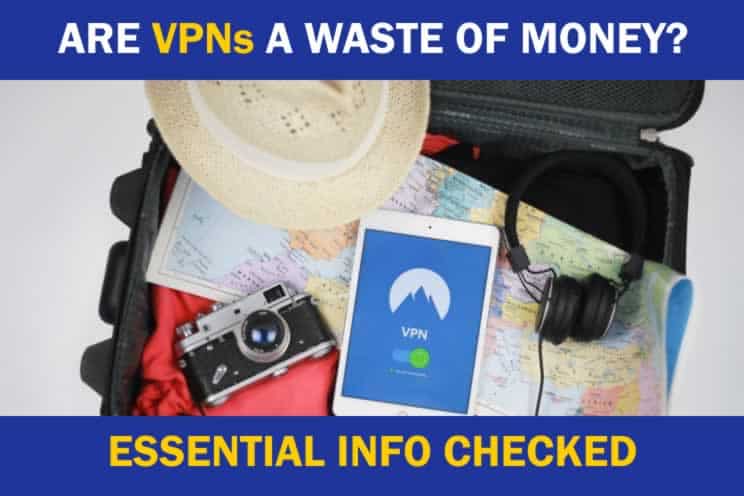
Virtual Private Networks, or VPNs, are a great way to hide your information from websites that you don’t necessarily trust. We live in an age where privacy is becoming rare, and VPNs are becoming an increasingly common way of shielding the identity of a user. But VPNs are not infallible, and some users wonder whether these services are worth it.
Are VPNs a waste of money? VPNs are worth the money if the user wants to buy peace of mind or a degree of anonymity. These virtual private networks are effective but not foolproof when it comes to privacy, which might constitute a waste to some users.
If you are of the opinion that any protection is worth paying for, you won’t think twice about spending money on a VPN. But if you want something to be 100% infallible, you may be disappointed. And think about it – is anything on the Internet ever going to be 100%? Let’s take a closer look at why a VPN might be a good move for you.
How Does a VPN Work – and Is It Worth It?
A user’s IP address is protected by reassigning your IP address from another network, so it’s not immediately obvious where your IP really originates. This goes a long way to protecting your personal information. However, a user’s IP information is still accessible if website admins or hackers know where to look.
VPNs are definitely worth the money for users who are looking to access websites they don’t trust or for users who are looking to access websites that are only available in certain countries (check out my list of reputable VPNs here).
Some websites actually trace and identify users to their VPNs, and block access when they know that a visitor is using one. Websites like Netflix, which block accessibility by country, do not allow VPN users to access their content.
This brings us to two important questions:
- Are VPNs worth it if the website you’re accessing knows you are using a VPN?
- Are VPNs worth it if hackers can identify your true IP address?
Not every hacker has the ability to figure out your true identity through your VPN and your behavior online, but there are always ways for the most tenacious online thieves to find out your information. Considering both website administrators and hackers can go around your security measures, are VPNs really worth the money?
VPN Server Types
There are two primary types of VPN servers: Physical Servers and Virtual Servers. Both types of servers are physical servers in the traditional sense of the term, meaning that they are dedicated computers that provide access and support for computer networks and online activity.
The Difference
The difference is that while both servers might provide users with an IP address from London, England, one server might be located in London, and the other might be located in France but will still provide users with a London IP address.
Benefits
- Virtual server – You can use the reliability of one location and the IP address of another location. So, if your VPN assigns you an IP address in Indonesia, your actual server location might be in Singapore. You will still get the geolocation of a user in Indonesia, but you will have the reliability of a physical server in Singapore, where there is more online infrastructure.
- Physical server – Your IP addressed will only be traced back to the geolocation where your actual server resides. So, an admin seeking to track your IP address will see that you are using an IP address from Indonesia, then can trace back the physical server to Indonesia.
The end of the line is where the physical server is, and it’s less suspicious if your server is based where it’s supposed to be. Not to say that every admin or official is looking for suspicious behavior but knowing that the end of the line is the physical location your server is helpful.
Where Do Servers Come From?
There are dozens, if not hundreds of VPN services these days (I use NordVPN, check out their latest deals). Every VPN service will highlight how many servers they have and how many choices there are of geolocations around the planet with which to hide their users’ identities. But the question pops up: where do these services get their servers?
The short answers can be somewhat worrisome if you’re just now looking into a VPN service — these companies lease their servers for the most part, and they do their business online for the most part. Technically, these VPN services are just like us: individuals in the dark looking to navigate the behemoth of the Internet with only a torch.
Because most of the servers employed by VPN services are leased, there is a log taken by the actual owners of the servers. Your VPN service will not take a log if they are reputable, but the information is out there somewhere.
Is a VPN’s Log Something to Worry About?
This is benign for anyone who is merely looking to access websites blocked in their country or for anyone who is looking to visit a website that they can’t completely trust.
You really don’t need to worry about the log! Only if you’re looking to hide from the greatest hackers in the world do you really need to fret over a log kept by anyone aside from the service — let alone anyone at all.
For the average prospective VPN customer, it’s probably a good thing that there is a record kept of everyone accessing the server in case someone with more malevolent intentions seeks to do damage. A third party with no stake in your identity has the records, and that’s a good thing!
You’re not looking to do anything but access Netflix from a different country or explore an online shopping website that you’re not yet sure if you can trust. The VPN service can’t be hacked because they don’t keep records and the server that’s located thousands of miles away only has information that can’t be used against you that comes via your VPN service in the first place.
Most Effective Uses of VPNs
It goes without saying that no security system is foolproof, but if you’re reading this blog entry, VPNs are most likely the security feature for you. Although many websites are cracking down on VPN services by finding IP addresses associated with them, more and more are added every day in order to circumvent this issue.
As long as you’re not trying to take on the government, a virtual private network will suit your needs perfectly.
Here are the two most common and effective uses for VPNs:
1. Navigating a Hostile or Untrustworthy Network
If you are at an airport or another very busy publicly accessible WIFI network, chances are you might be dealing with hackers. It might sound paranoid, but hackers prey on unsuspecting users in public places like airports and even busy coffee shops.
Hackers use something called Man In The Middle Attacks, or MITM, where they are able to fake communication with you through their exploitation of the network. Maybe you think you’re emailing with your friend when you’re actually talking to a hacker who’s seeking to gain your passwords and information.
VPNs allow you to work around these potential attacks by shielding you from the public networks where hackers lurk in secrecy.
2. Browsing an Untrusted Website
This is probably the most commonly thought of use for a VPN. Although VPNs, like every security technology, are not foolproof, they will provide an extra layer of support against any hacker seeking to rip off your information.
At the end of the day, there is really no way to fully protect yourself from online threats because security technologies and hackers are evolving their tactics alongside each other. But the simple truth remains hackers want to do as little work as possible. If you are protected, and someone else isn’t, they will go after the user who isn’t protected. You don’t have to be Fort Knox, but you should always strive to be as safe as you can.

